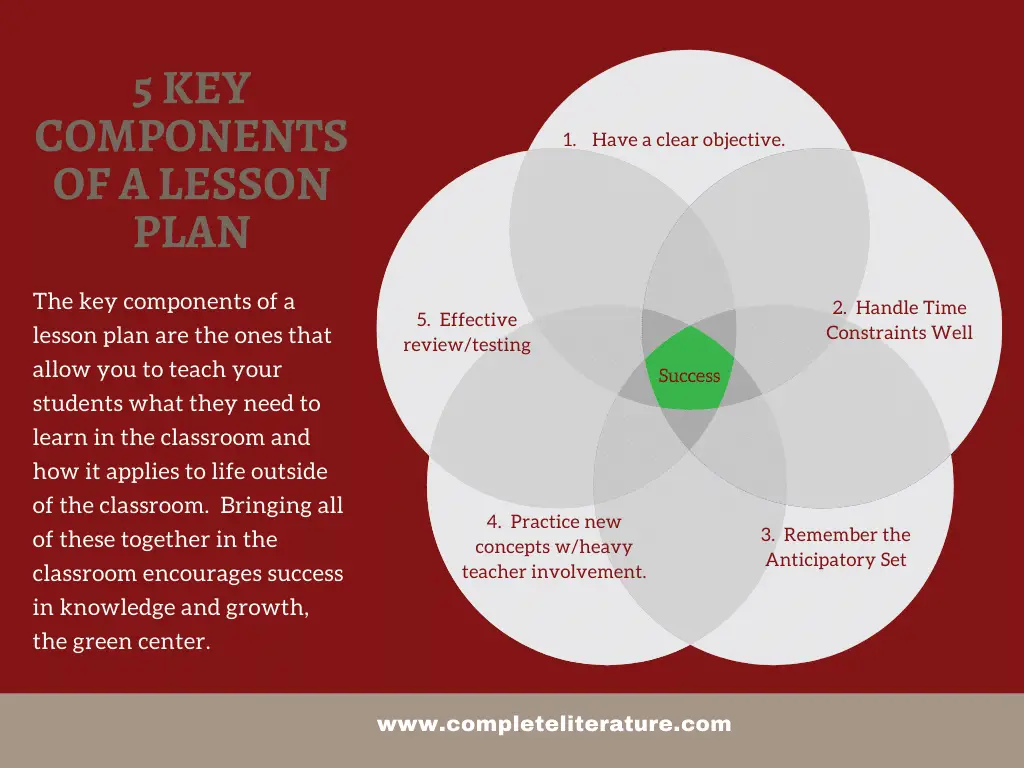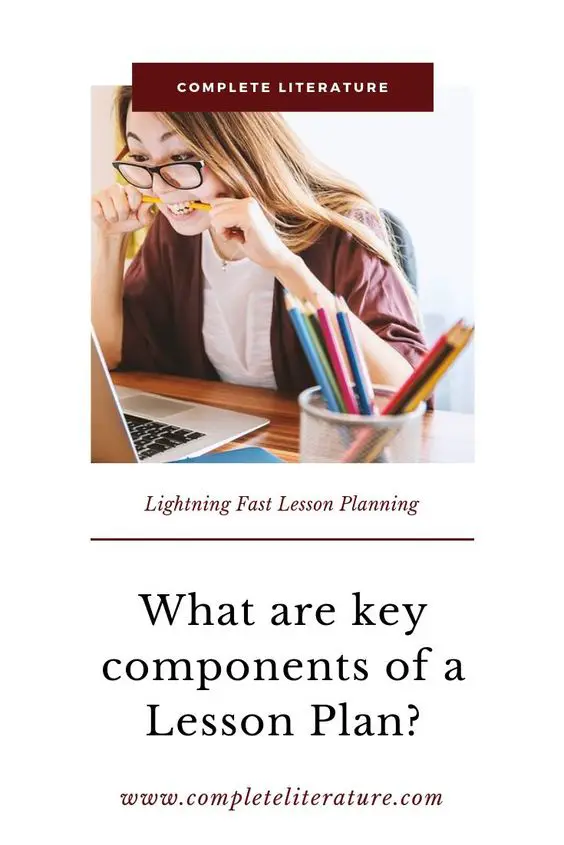Most of us don’t really think too much about what the specific key components of a lesson plan are in our daily planning. But for newer teachers, it can be a daunting process. And for those of us that have done this countless times before, it is always good to have a bit of a refresher.
So I looked online for what different teachers/professionals considered to be the key components of lesson planning. I found the lists to be remarkably similar, which is a really good thing.
So what are the key components of a lesson plan? The key components are the ones that allow you to teach your students what they need to learn in the classroom and how it applies to life outside of the classroom.
Lesson planning is done with a goal in mind: making sure the students learn what they need to. The results are often drastically different, but the planning process is comfortingly similar.
So let’s take a look at 5 of the most significant components of a lesson plan that will help your classroom run more smoothly and your students more fully understand what and why they are learning.

Table of Contents
1. Have A Clear Objective
The first thing you really need to do is to think of the desired end result. You need to figure out what you need your goal to be. Then work through to that goal. Figuring out the number of classes, time in each class, academic vs. extra-curricular activity, and many more factors will affect how you reach your goal. But unless you know exactly what you want your students to get out of the lessons and activities, you will not be able to formulate how to get there efficiently.
2. Learn to Handle Time Constraints Well
This is a huge factor in working out lesson planning, no matter what kind of school you are planning for.
Frequently, you are going to have way too much planned and not nearly enough time to do it in. Once in a while, you will blaze through the material and have time left over. For most teachers, that is not a problem because there are always extra activities to do. And its also not a problem to have too much planned and not enough time to do it in. It is actually a pretty rare thing to have the timing of the plans work out perfectly. Just make sure that you front load the things that you really want to get done.
3. Remember the Anticipatory Set
This gem is not going to be included in all of your lesson plans. But you should include it almost daily in the item that you would like to most drive home. It could be a character quality, critical life-lesson, or math concept that they will need later in life. Literally, it can be whatever you want it to be. But you want it to be included in lessons for the day that you want to emphasize the most.
So, what is an anticipatory set? It is an object lesson that points to a concept that you want to teach. It places emphasis on that concept because it grabs your students’ attention. In fact, the activity that kicks off the anticipatory set is called the “hook” for that reason.
One of the best things about the anticipatory set is that it is an incredibly broad instrument. And that gives you a liberal brush to work with your class.
An Example of the Anticipatory Set
A great example of how I used anticipatory sets would be to start the class off with a small snack/taste of food that relates to the topic. As they eat, discuss with the class the aspects of the snack that you want to draw their attention to. But don’t give away the lesson yet! Keep them in suspense.
The next thing I did was either a physical activity or short game. Those also drove home points for the upcoming lesson. But still don’t give away too much info. Give them just a bit more than they got during the snack time.
Putting it All Together
I do want to take a minute to discuss the number of activities versus the availability of time. I was able to do two to three anticipatory sets for my Kids’ Club lessons because those were two-hour classes. For my school classroom, I did not often have the luxury of multiple sets, unless I really felt that they were important enough to take time from another activity during that day that wasn’t necessarily as important to do.
You will need to figure out which items will need to take priority based on the goals you are trying to achieve and the time you have to do them in.
Once you have finished the anticipatory set(s), then you are ready to start the lesson. The students’ interest is piqued. And because you have their attention, you can now draw all of the connections from your previous activities. As you teach through the lesson, remember to refer back to the anticipatory sets that you used. It will not only engage your students, it will help them to remember what they learned for a long time.
For more information about this and some information from the Madeline Hunter, who developed and named this concept, click on this link to her manual. She has some amazing thoughts regarding work in the classroom and working with your students.
4. Practice New Concepts with Heavy Teacher Involvement
This key component of lesson planning actually has two parts. The first is, of course, having the student put into practice what they learned in the lesson. That can take almost infinite forms. Some ideas are:
- Classroom discussion with note-taking, either in a journal or a worksheet.
- Another small game, maybe even a round of the previous game used in the anticipatory set. The advantage to this is that it drives home the purpose of the anticipatory set as well as the lesson even more.
- A craft that emphasizes the points you learned or theme you are studying.
- A science experiment that physically illustrates a point.
- A video that reinforces what they just learned.
Once again, the idea here is to link back to everything they have already done. Theming is king.
The second part of this is direct teacher involvement with the kids. Rather than being at the front of the classroom with the students listening to you, be among them. Engage them on what they just learned in a cooperative way. Choose activities that allow them to give feedback to you as you all work through it. Mutual involvement as you work through the practice of what they have learned helps them to feel more confident in trying out the new concepts. And as always, it makes them feel like they are acknowledged and cared about.
5. Effective Review/testing
This step is universally the way most lesson plans end the work of the class. Classroom discussion is a great way to accomplish this. The teacher can guide the discussion and allow the students to fill in the gaps with what was covered through the lesson. Completing with an oral mini-quiz also reinforces exactly what the teacher wanted the students to learn. It gives the students an idea of what they need to remember. And it helps the students to feel confident that they learned what they needed to in the class. It also helps assure the teacher that the students actually did learn what she set out to teach them.
Conclusion
While I only included 5 of the most basic key components of a lesson plan, there are several more components that could be added.
This is merely a guide. As teachers see their plans forming, inspiration will take over. And they will know which aspects they want to concentrate on.
The biggest thing they need to remember is to keep it simple. The more complex it becomes, the harder it will be to implement and keep track of.
What are some key components of a lesson plan that you have found worked well in your classroom? I would love to hear what specific things helped you to develop your current lesson planning strategies. Feel free to leave a comment!
For more information on lesson planning, click on the links below:
How to Accomplish More Effective Lesson Planning






I didn’t realize what all a lesson plan had! It just reminds me how wonderful teachers are.
Wow I had no idea how much went into making a lesson plan. Thanks so much for opening our eyes!
This is like straight up writing a dissertation: So many steps to follow. I never knew there was so much criteria to meet when it comes to lesson planning.
These tips are helpful for me too as I also work as a trainer.Time management is really important for any lesson plan.
Yes, Amila, this works in really any field that has a significant amount of planning. Thank you for sharing!
Wow, lesson plans are complex! I always though they were shorter. It seems there is a lot to balance in a lesson. How in the world do teachers do it?
It is difficult, especially at first. But the longer they teach, the easier it gets.
Never really thought to break down a lesson plan to these elements before, but yes- this totally makes sense! I love the anticipatory set part especially!
The anticipatory set is so much fun for me because of how the kids react. I love surprising them with at least a little something.
My daughter is a teacher so I see all her planning for her lesson plans. It surely is alot of work.
All of these are great tips. Sounds like an organized way to have a lesson plan.
Thank you. This was thought provoking. A lot of times things either seem super simple or complex. And when they seem simple and I realize they’re not m…it’s easy to get overwhelmed or vice versa. When it’s complex, what do you do? This was a well thought out article that gets you thinking about how to really have a lesson plan go smoothly.
Thank you, Lauren!
I dont even know that this much goes into planning a lesson!Teachers are really great!
I’m not a teacher but all of this helps me to help my daughter at school! Thanks for sharing 🙂
Yes! Everyone who spends any time around children can get some good ideas from this blog!
It’s hard to say, but as a teacher I don’t prepare proper lessons plans, as I don’t have time for that. I usually have a look at the topic and the activities it’s followed by. I bet a proper lesson plan would be quite useful for me. 🙂
I have gotten “lazier” about formal lesson plans over the years myself. Mostly because the more we do it the more it is already in our head, so we don’t need them as much as we did when we were starting out. But you are right that doing them more could help us to be better organized. 🙂
I have several friends and relatives who are teachers. They work hard and put a lot of their own time and resources into the education of their students. Lesson planning is one of many components to a successful classroom experience…nice post!
Very nice tips indeed. It is true even in banking world, we always start our project with a goal in mind. In all case, i like the conclusion as well where you say completing with an oral mini-quiz, this is a good thing as it will reinforce the learning among students. well done.
O yes these are some great tips. Having an organization is good so you can really plan the things. Lots of work. – Paolo
A lot of my friends are teachers and I see how much hard work goes on behind the scenes. Thank you for giving me a better understanding. I always knew they were wonderful humans
This post is super helpful to me in my new homeschooling adventure! I have never been a teacher, but I am soon to find out how to be one!
You’ve got this!!!! Don’t let the difficulties get to you! I was told when starting out that it takes about 3 years to finally be comfortable with your school routine, whether teaching in a school or homeschool. And I found it to be 100% true in both instances! Thanks for sharing. 🙂
Love the flower like venn diagram for illustrating the key components. Suppose to be revising a video for one of my classes myself tonight, but due to a stomach bug, I am leaving to the morning. I don’t think any of my students need to see me throw up in the video.
Haha, you made me smile in the middle of your difficulty. I do love your sense of humor and I hope you are feeling better!
As a teacher, I always find your posts so informative :o)
Number 2 is the one I struggle with the most because I like to allow a bit of free expression as I believe it paves the way for more authentic learning experiences.
Number 2 is probably my hardest one as well, especially when the kids are responding well to the activities and I don’t want to stop because they are enjoying it. Thank you for sharing!
I didn’t realize there’s so much going on in making a lesson plan! I think teachers will find this useful!
This is really very well outlined. Reading your blog post reminds me so much of home. Growing up with parents whom are both teachers, classroom and home always feels the same.. But again, it reminds me so much about the efforts teachers put in trying to find a way to make their students learn. Keep it up.
Thank you, Ewuzie!
Did you know that my dream was to be a teacher? I am very sorry not to have chased him, but I console myself with your blog!
Those are all great tips for effective lesson planning. My dad was a teacher for over 30 years. I remember him putting together his lesson plans. Some of those tips can apply to other things as well, not just lesson planning.
Thanks for pointing out these 5 points. I think teachers need this summary of all the lesson plan out there. And I couldn’t agree more that teachers need to keep it simple, while still maintaining room for improvement down the road.
I think so many parents will be helped by this. With the way things still are out there, I know a lot of parents who are homeschooling again this year.
This very helpful post. Having this knowledge about the 5 components. I will keep doing just that. Thanks Soo much.
When it comes to planning lessons setting the goals is very important. Great article as always.
There’s a lot of consideration that goes into the lesson plans. Wow! I like seeing insights on how things are done.
There is so much that goes into teaching . I tried it for a few years and couldn’t hack it lol I was terrible at lesson planning. If I had resources like this I may have stuck with it. You rock!
oh my!!! I had no idea so much goes into preparing lessons wow!!!! I guess i would fail as a teacher lol…
I think of all the things teachers have to do, lesson plans would be the one thing I would actually enjoy. My teacher friends think otherwise though.
Awesome blog. Super interesting, I will try your tips!
very well written post. as a former teacher, i LOVE your diagram of the different components.
I think you’ve provided a good guide, as you mentioned, and given the nuts and bolts of elements to include. Educators can be motivated to adapt and adjust!
Hhhhmmmm….these are good pointers for me to use, next, on my school outreaches. I usually struggle with drafting the first part of my lesson.
it seems quite complex to prepare a lesson plan. It is why I am not a teacher lol I’m not good at those kinds of things.
No doubt as always this blog post is truly very helpful and informative..glad you shared this with us…found it very lovely and great one…great work though…
Love these lesson planning tips! As a homeschool mom of 12 years, it’s taken me a while to learn my groove for writing plans that work for my kids.
This makes so much sense! I never really thought how a single lecture took so much of planning by my teachers! Very resourceful.
This is really helpful for me. I am a private tutor and soon school starts here in Philippines. Thank you for sharing.
Great tip for any teacher or someone presenting a lesson plan. I think so many people can benefit from this.
awesome post!! I never knew so much work went into planning a lesson. It definitely makes me appreciate teachers more
This is definitely helpful for teachers! I don’t have much experience with lesson plans but this is really useful! Thanks for sharing this with us!
These are such a great tips! My sister as a new teacher has just joined a school. So I am sure she will definitely find these tips useful. Sharing with her and my teacher friends ☺
Thanks,
Anamika
https://www.everythingenchanting.com
I think Practice New Concepts with Heavy Teacher Involvement is really one of the most important component of a lesson plan. It really helps in crafting a good lesson plan.
Good Lord! Teachers really have a lot to deal with and I most certainl applaud them. It takes a really special person to be a teacher and I appreciate them all!
Candy Rachelle
Keeping Up With Candy
http://www.keepingupwithcandy.com